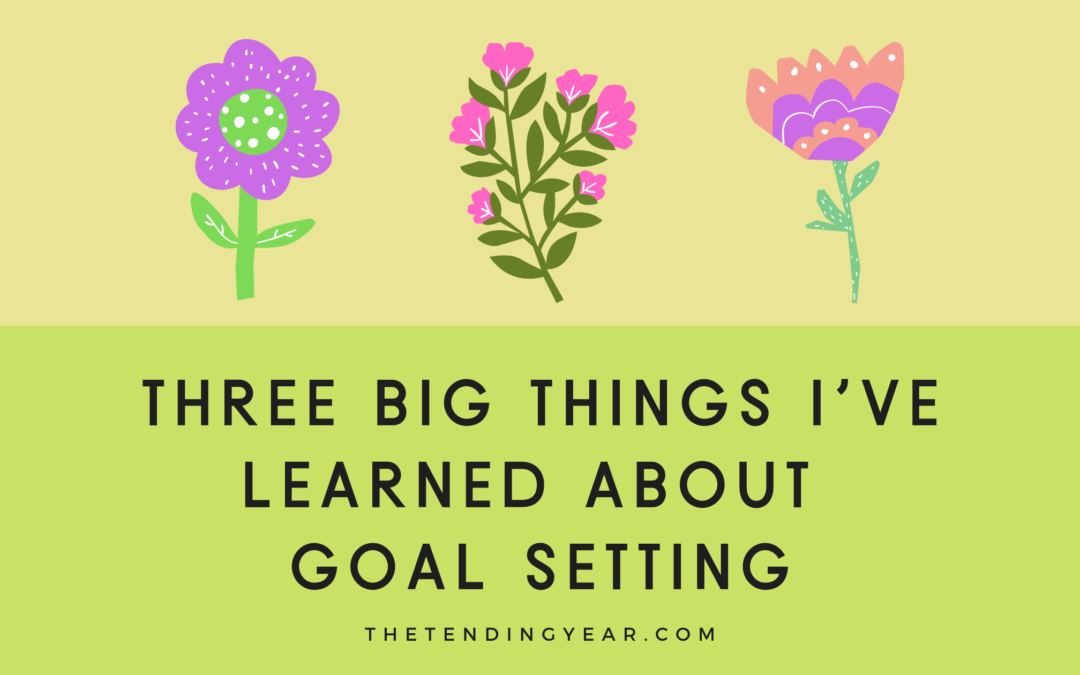Before we jump into the blog post, I want to quickly let you know that I’ll be offering a monthlong course called all about clarifying your goals and achieving them through intentional productivity sessions. You can learn more about the course here. Thanks for your time, and enjoy the blog post!
Goal setting is one of my favorite topics.
I dedicated a whole chapter of my book Tend to It: A Holistic Guide to Intentional Productivity to setting reachable goals, and it’s a topic that comes up in every one of my coaching calls. Today I want to talk about a few key themes that I’ve learned about goal setting over my years in grad school, as a writer, as a consultant, and as a Productivity Coach.
#1: Working On A Goal Can Feel Overwhelming
When I struggle to make progress during a productivity session it’s usually because I’m trying to accomplish a GOAL, not a specific TASK. When I was writing my dissertation, if I put “work on my dissertation” on my to-do list, I usually spent the first half of my scheduled dissertation time trying to decide what to focus on, encountering false start after false start. A dissertation is a BIG goal with lots of behind the scenes labors (research, brainstorming, outlining, revising, reflecting, parsing out your advisor’s feedback, bridging chapters together, and many more etceteras). It’s easy to end a productivity session despairing that you’ll never make forward progress. But when you shift your approach from your BIG goal to your component chapters/milestones/steps, and when you break those steps down into actionable tasks, you give yourself a micro-goal that you can achieve in a single productivity session, which feels AWESOME.
#2: Make Your Deadlines Feel Real, Not Arbitrary
Some goals have hard deadlines: most graduates school applications are due around December or January, the Boston Marathon happens on the third Monday in April, and there’s a long list of deadlines for things like starting a business or applying for jobs. But some goals have more lax deadlines or no deadlines at all–and these are often the trickiest to complete! We know from Parkinson’s Law that a task might expand to fill the time you give to it…and sometimes we end up waiting until right before the deadline to complete the whole thing anyways! This was my experience in graduate school when I was in coursework: I would, without fail, wait to work on my term papers until the weekend before they were due, camping out in the local college library and frantically typing away. The reason I did this instead of chipping away at my paper over the span of a month was because I never broke down my paper into steps and tasks and assigned tasks to deadlines that were realistic for me to hit. When you reverse engineer your approach through purposeful deadlines, you do a big kindness to yourself.
#3: Personalized Productivity Sessions Are Where It’s At
One-size-fits-all approaches to productivity often sell us a foolproof process to finding massive success in a promised timeline. While these versions of success (working few hours, being incredibly effective, moving up in the world, making a ton of money) do sounds amazing, the required amounts of focus, energy, and physical effort are simply inaccessible to many folks, which makes productivity feel like an uphill battle. I’m not saying that productivity approaches and tools are bad–I use many of them every day!–but I’m suggesting that we make them work for us. Here’s how I do that:
1. Make sure you understand how a productivity, time management, or prioritization tool works. What’s the science or psychology behind it? Why do people usually reach for it?
2. Adjust the tool to meet your real life experience. If an approach requires you to do something everyday, but doing so would cause you distress, pain, or overwhelm, how can you adjust, tweak, or hack that tool to still benefit from it without trying to force yourself into an inaccessible or unpalatable box? This approach is particularly helpful for folks who live with chronic physical or mental health issues, for working parents and caretakers, and for people who are juggling different goals at once.
I hope you found these three big things about goals inspiring! If you want to dive deeper into setting your own goals, check out my course Perceptible Progress: A Goals Course, which is running from September 1 through September 30, 2022! You can learn more about the course and sign up below.
Don’t forget to subscribe to my twice a month newsletter below to get your FREE guide to habit formation and maintenance! You can read more about my coaching practice here and book a session here.

